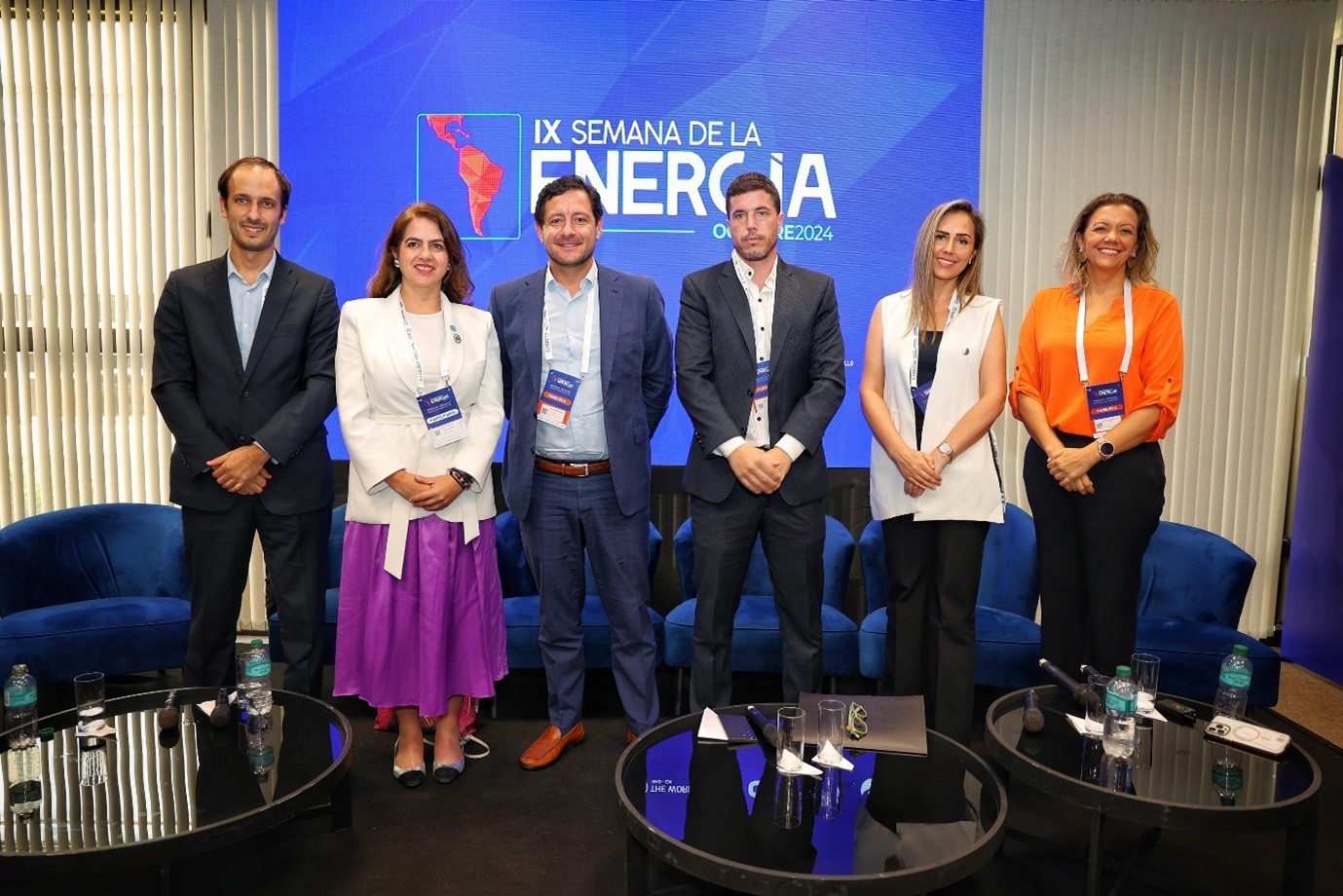The 2024 Energy Week, organized by the Latin American Energy Organization (OLADE) in Asunción, Paraguay, aimed to promote collaboration and innovation among the 27 member countries on key issues such as renewable energy, gender equity, and a just transition.

Asunción, Paraguay, 8 November 2024 (IICA) – Biofuels are the fastest and most efficient tool to decarbonize land transport in Latin America, according to public and private sector experts, academia, and civil society representatives gathered at the region’s most important energy event, which included significant participation from the Inter-American Institute for Cooperation on Agriculture (IICA).
The 2024 Energy Week, organized by the Latin American Energy Organization (OLADE) in Asunción, Paraguay, aimed to promote collaboration and innovation among the 27 member countries on key issues such as renewable energy, gender equity, and a just transition.
Within this context, the central role biofuels are expected to play in the region’s energy transition was highlighted, given their vast potential in biomass production.
“Over 60 countries already use blends of bioethanol with gasoline and biodiesel with fossil diesel. In addition to decarbonizing transport, biofuels add value to rural areas and create numerous jobs,” said Agustín Torroba, Biofuels Specialist at IICA and Executive Secretary of the Pan American Liquid Biofuels Coalition (CPBIO), during the conference “Biofuels: Public-Private Interaction and New Technologies.”
“Sustainable aviation fuels (SAF) are also joining these biofuels, which will be key to decarbonizing aviation. The Americas can become the leading region for SAF production and export thanks to their abundant sustainable raw materials,” Torroba stated.
Energy Sovereignty
OLADE is a public intergovernmental organization focused on cooperation, coordination, and technical advisory, established in 1973 to promote the integration, conservation, sustainable use, commercialization, and protection of the region’s energy resources.
OLADE’s Energy Week was organized in collaboration with Paraguay’s Ministry of Public Works and Communications, the Inter-American Development Bank (IDB), the World Bank, and the Development Bank of Latin America and the Caribbean (CAF). The event provided a valuable opportunity for exchange and collaboration, helping to establish a roadmap for energy transitions across Latin America and the Caribbean.
Carolina Rojas, President of the Colombian Biofuels Federation, explained that “biofuels are key to decarbonizing transport in Latin America and strengthen energy sovereignty. In Colombia, biodiesel and bioethanol contribute 84% of transport carbon emission reductions. The region is making strides in advanced biofuels like SAF, with the potential to become a hub thanks to its expertise and abundant raw materials.”
“We’re sending a clear and forceful message to the public: liquid biofuels will remain relevant in Latin America as the best option for agro-industrial and social development, while ensuring better air quality for our children,” stated Juan Sebastián Díaz, Deputy Director of the U.S. Grains Council.
Carolina Bauman, Plant Manager at the Paraguayan state-owned company Petropar, noted that the company accounts for 20% of Paraguay’s total sugarcane ethanol production.
“By choosing ethanol as a cleaner alternative, the company contributes to decarbonization and emission reduction, promoting a shift toward a sustainable energy matrix. With these initiatives, Petropar positions itself as a reference for social and environmental responsibility in the country,” Bauman explained.
Francisco Jauregui, Vice President of the Paraguayan Chamber of Biofuels and Renewable Energies (BIOCAP), emphasized the importance of public-private synergy in boosting biodiesel, adding that although Paraguay’s market is small, it is quite solid. He highlighted the state’s decision to increase biofuel blending percentages and pointed out that Paraguay’s challenge is to keep pace with the region, building on the progress already made.
Finally, Heloisa Borges Esteves, Director of Oil, Gas, and Biofuels at Brazil’s Energy Research Office (EPE), discussed the ‘Fuels of the Future’ law in Brazil, which reflects a consensus on the role of biofuels.
“It is a clear sign that advanced biofuels are a main pillar of Brazil’s energy transition. However, we need to improve communication, as today an ethanol-powered car is far more sustainable than an electric car in Europe or the United States. In terms of cost-benefit, biofuels are the best option for decarbonizing the transport sector in Latin America,” Borges Esteves concluded.
The Pan American Liquid Biofuels Coalition (CPBIO) brings together major business and industrial organizations across the Americas dedicated to the production and processing of sugar, alcohol, corn, sorghum, soybeans, vegetable oil, and grains, among other agricultural products. The coalition’s mission is to decarbonize the economy by promoting and sustainably consuming these clean energies throughout the hemisphere. The coalition was established in 2023 at the Pan American Liquid Biofuels Summit organized in San José by IICA, which also serves as the coalition’s Technical Secretariat.
More information:
Institutional Communication Division.
comunicacion.institucional@iica.int











